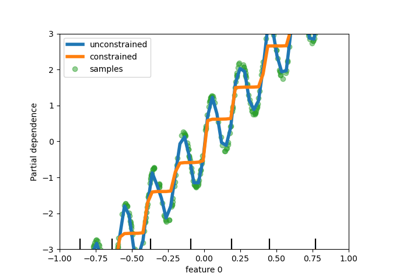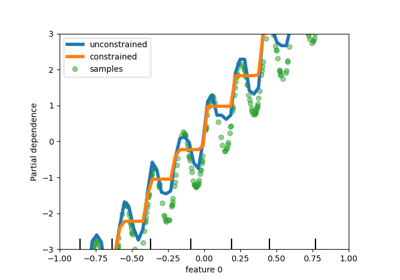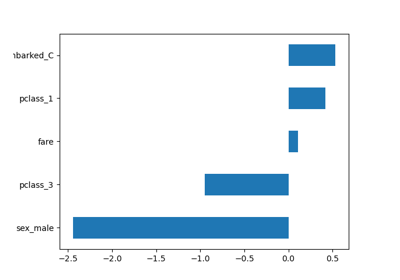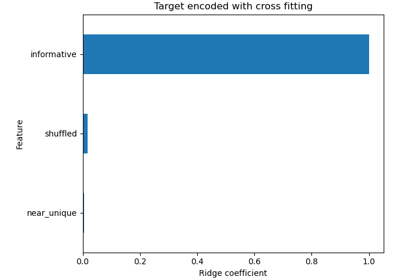set_config#
- sklearn.set_config(assume_finite=None, working_memory=None, print_changed_only=None, display=None, pairwise_dist_chunk_size=None, enable_cython_pairwise_dist=None, array_api_dispatch=None, transform_output=None, enable_metadata_routing=None, skip_parameter_validation=None)[source]#
Set global scikit-learn configuration.
Added in version 0.19.
- Parameters:
- assume_finitebool, default=None
If True, validation for finiteness will be skipped, saving time, but leading to potential crashes. If False, validation for finiteness will be performed, avoiding error. Global default: False.
Added in version 0.19.
- working_memoryint, default=None
If set, scikit-learn will attempt to limit the size of temporary arrays to this number of MiB (per job when parallelised), often saving both computation time and memory on expensive operations that can be performed in chunks. Global default: 1024.
Added in version 0.20.
- print_changed_onlybool, default=None
If True, only the parameters that were set to non-default values will be printed when printing an estimator. For example,
print(SVC())while True will only print ‘SVC()’ while the default behaviour would be to print ‘SVC(C=1.0, cache_size=200, …)’ with all the non-changed parameters.Added in version 0.21.
- display{‘text’, ‘diagram’}, default=None
If ‘diagram’, estimators will be displayed as a diagram in a Jupyter lab or notebook context. If ‘text’, estimators will be displayed as text. Default is ‘diagram’.
Added in version 0.23.
- pairwise_dist_chunk_sizeint, default=None
The number of row vectors per chunk for the accelerated pairwise- distances reduction backend. Default is 256 (suitable for most of modern laptops’ caches and architectures).
Intended for easier benchmarking and testing of scikit-learn internals. End users are not expected to benefit from customizing this configuration setting.
Added in version 1.1.
- enable_cython_pairwise_distbool, default=None
Use the accelerated pairwise-distances reduction backend when possible. Global default: True.
Intended for easier benchmarking and testing of scikit-learn internals. End users are not expected to benefit from customizing this configuration setting.
Added in version 1.1.
- array_api_dispatchbool, default=None
Use Array API dispatching when inputs follow the Array API standard. Default is False.
See the User Guide for more details.
Added in version 1.2.
- transform_outputstr, default=None
Configure output of
transformandfit_transform.See Introducing the set_output API for an example on how to use the API.
"default": Default output format of a transformer"pandas": DataFrame output"polars": Polars outputNone: Transform configuration is unchanged
Added in version 1.2.
Added in version 1.4:
"polars"option was added.- enable_metadata_routingbool, default=None
Enable metadata routing. By default this feature is disabled.
Refer to metadata routing user guide for more details.
True: Metadata routing is enabledFalse: Metadata routing is disabled, use the old syntax.None: Configuration is unchanged
Added in version 1.3.
- skip_parameter_validationbool, default=None
If
True, disable the validation of the hyper-parameters’ types and values in the fit method of estimators and for arguments passed to public helper functions. It can save time in some situations but can lead to low level crashes and exceptions with confusing error messages.Note that for data parameters, such as
Xandy, only type validation is skipped but validation withcheck_arraywill continue to run.Added in version 1.3.
See also
config_contextContext manager for global scikit-learn configuration.
get_configRetrieve current values of the global configuration.
Examples
>>> from sklearn import set_config >>> set_config(display='diagram')
Gallery examples#
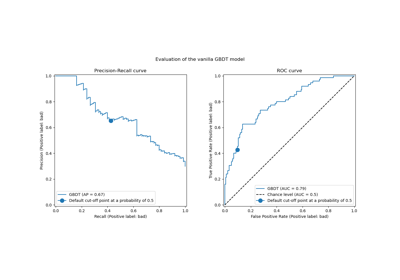
Post-tuning the decision threshold for cost-sensitive learning

